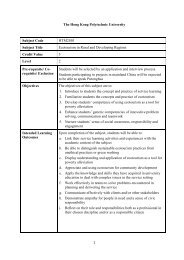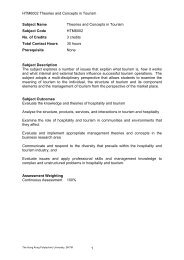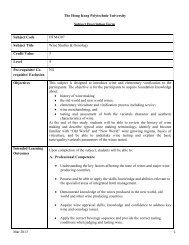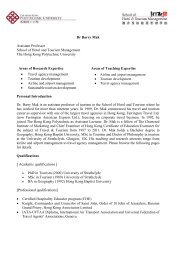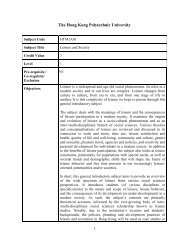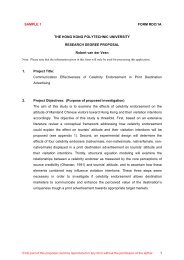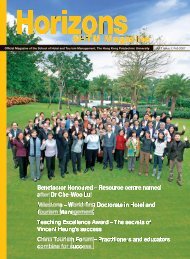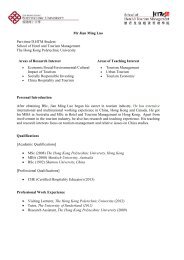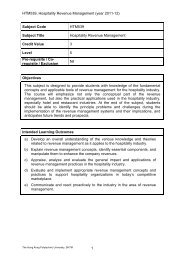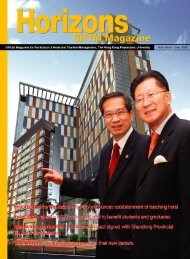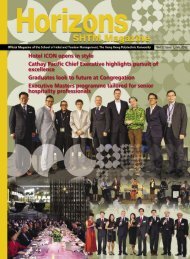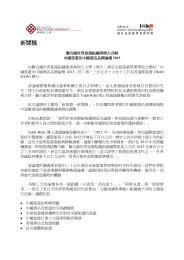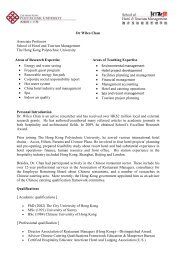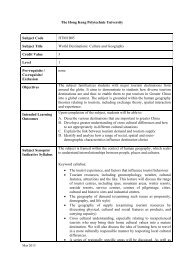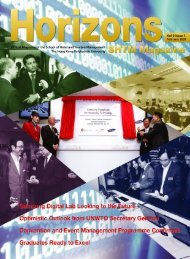Uniquely Branded Hotel ICON Reaches for the Sky - School of Hotel ...
Uniquely Branded Hotel ICON Reaches for the Sky - School of Hotel ...
Uniquely Branded Hotel ICON Reaches for the Sky - School of Hotel ...
You also want an ePaper? Increase the reach of your titles
YUMPU automatically turns print PDFs into web optimized ePapers that Google loves.
Research Horizons Volume 4. Issue 2. Sept 2010<br />
Tourism Cooperation Imperative <strong>for</strong> Hong Kong,<br />
Macau and Zhuhai<br />
Regional cooperation is vital to ensuring that tourism<br />
continues to boom in Hong Kong, Macau and Zhuhai<br />
argues <strong>the</strong> SHTM’s Pr<strong>of</strong>essor Cathy Hsu in a recently<br />
co-authored research article. Although <strong>the</strong> central<br />
government has created a process that will eventually<br />
lead a ‘barrier-free’ tourism zone in <strong>the</strong> Pan Pearl River<br />
Delta region, many difficulties remain. The researchers<br />
analyse <strong>the</strong> current state <strong>of</strong> complementarity and<br />
competition between <strong>the</strong> three cities, highlighting <strong>the</strong><br />
importance <strong>of</strong> a comprehensive “joint regional plan” <strong>for</strong><br />
tourism development.<br />
Importance <strong>of</strong> Regional Cooperation<br />
The researchers note that despite Macau’s gambling<br />
boom, tourism growth in <strong>the</strong> city is restrained by a lack<br />
<strong>of</strong> land and labour. From this perspective alone, regional<br />
cooperation would be beneficial – Hong Kong supplies<br />
Macau’s excess labour requirements and a substantial<br />
number <strong>of</strong> visitors, and Zhuhai is <strong>the</strong> gateway through<br />
which most mainland Chinese visitors arrive in Macau.<br />
The bridge that will connect <strong>the</strong> three cities by 2013<br />
could bring benefits to each city, but also raises <strong>the</strong><br />
spectre <strong>of</strong> increased competition.<br />
“How to coordinate and harmonise tourism development<br />
in <strong>the</strong>se destinations”, write <strong>the</strong> researchers, “is<br />
becoming an urgent issue that deserves attention from<br />
<strong>the</strong> government, industry and scholars”.<br />
What <strong>for</strong>m should this cooperation take? The<br />
researchers suggest that any regional cooperation should<br />
have five distinct features. These include capitalising<br />
on <strong>the</strong> region’s overall strengths while emphasising <strong>the</strong><br />
uniqueness <strong>of</strong> each destination, developing tourism<br />
in each destination equitably and complementarily,<br />
coordinating job creation and labour training to<br />
improve <strong>the</strong> entire region’s tourism service, developing<br />
infrastructure by collective ef<strong>for</strong>t and easing restrictions<br />
to facilitate travel throughout <strong>the</strong> region.<br />
The major barriers to cooperation, argue <strong>the</strong> researchers,<br />
are unequal development within a region and <strong>the</strong><br />
pursuit <strong>of</strong> local agendas. “Cooperation will be difficult”,<br />
<strong>the</strong>y note, “when each destination has its own plan to<br />
promote self-interests and benefits”.<br />
Experts Consulted<br />
Given <strong>the</strong> lack <strong>of</strong> research into how <strong>the</strong>se considerations<br />
might affect cooperation between Hong Kong, Macau<br />
and Zhuhai, <strong>the</strong> researchers conducted a series <strong>of</strong><br />
face-to-face interviews with 30 government <strong>of</strong>ficials,<br />
industry executives and academics. Ten such experts<br />
from each destination agreed to be interviewed, with<br />
more than half <strong>of</strong> <strong>the</strong> interviewees drawn from <strong>the</strong><br />
pr<strong>of</strong>essional ranks <strong>of</strong> <strong>the</strong> tourism industry itself.<br />
The objective <strong>of</strong> this exercise was to create a pool <strong>of</strong><br />
in<strong>for</strong>mation on which to conduct an analysis <strong>of</strong> <strong>the</strong><br />
strengths, weaknesses, opportunities and threats facing<br />
tourism development in <strong>the</strong> three cities independently,<br />
and <strong>the</strong>n <strong>for</strong> <strong>the</strong> region as a whole.<br />
Tourism Contexts <strong>of</strong> <strong>the</strong> Individual Cities<br />
The Hong Kong experts saw <strong>the</strong>ir city as a destination<br />
<strong>for</strong> “fine dining, shopping and family vacations”, with<br />
Macau identified as one <strong>of</strong> its major competitors. The<br />
main weaknesses identified were <strong>the</strong> high cost <strong>of</strong> doing<br />
business and problems with accommodation capacity.<br />
The bridge linking Hong Kong to Zhuhai and Macau<br />
was seen as a major tourism opportunity in <strong>the</strong> near<br />
future, and <strong>the</strong> most significant threats were <strong>the</strong> loss <strong>of</strong><br />
MICE tourism to o<strong>the</strong>r cities, and <strong>the</strong> specific loss <strong>of</strong><br />
middle- and senior-level managers to Macau.<br />
<strong>School</strong> <strong>of</strong> <strong>Hotel</strong> and Tourism Management 3


